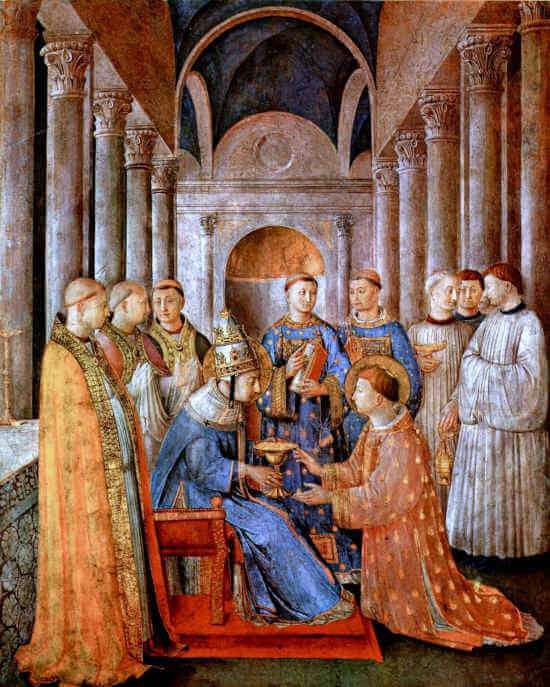Eifelheim - Preliminary Thoughts
A Few Chapters In
I thought I would share some of my preliminary thoughts on my reread of Michael Flynn’s Eifelheim. This may be something I try to do more of before we discuss any book as part of the I Might Believe in Faeries book club to get my thoughts on “paper” so to speak. I don’t want to over promise anything, but I have the urge to write something anyway!
The story begins in August, 1348 on The Commemoration of Sixtus II and His Companions at Matins, which is 2:00 am. The first paragraph reads:
Dietrich awoke with an uneasy feeling in his heart, like a bass voice chanting from a darkened choir loft. His eyes flew open and darted about the room. A night candle guttering in its sconce cast capers over table and basin, prie-dieu and psalter, and caused the figure on the crucifix to writhe as if trying to tear iself down. In the corners and angles of the room, shadows swelled enormous with their secrets. Through the east windows, a dull red glow, thin as a knife across a throat, limned the crest of the Katerinaberg.
I have begun to pay close attention to the first paragraph or chapter of novels. Often, the author foreshadows the events of the novel or crafts some sort of microcosm of the story within the first section. The first paragraph is also where the main character is introduced and the reader is given their first impression of him or her.
Dietrich, as we find out later, is a secular (diocesan) Catholic priest in a remote village. The opening of Eifelheim shows Dietrich seems to be haunted by “shadows swelled enormous with their secrets” and he is uneasy. As we come to read later in the first chapter, Dietrich used to be a scholar and is quite unflappable in the face of the unknown. He is very astute and always provides a rational explanation (rightly or wrongly) to the more superstitious members of his flock. The fact that the very first chapter shows him uneasy with eyes darting in the dark, gives away the true nature of his heart. He does not know peace and he even might have secrets that haunt him.
The story also begins on The Commemoration of St. Sixtus II and His Companions, who were all martyred under Emperor Valerian II. The martyrdom of this saintly Pope and his six companions might be a portent of both doom and hope for Dietrich and his village. We might need to pay attention to the story of St. Laurence, whose feast is a few days after St. Sixtus II, as we continue on in Eifelheim.
“Only a few feasts possess a Vigil-Night. Why is St. Laurence among them?” Theresia shook her head, which meant she did remember, but preferred that Dietrich tell her.
“A few days since, we remembered Pope Sixtus II, who was killed by the Romans while praying Mass in the catacombs. Sixtus had seven deacons. Four were killed at the Mass with him and two others were hunted down and killed the same day. That is why we say ‘Sixtus and his companions.’ Laurence was the last of the deacons, and eluded capture for several days. Sixtus had given him the possessions of the Church for safekeeping — including, so they say, the cup from which Our Lord drank at the Last Supper and which the Popes had used at Mass until then. These he had distributed to the poor. When the Romans found him and ordered him to hand over ‘all the wealth of the Church,’ Laurence took them into the hovels of the city and showed them the poor, declaring —”
“There is the wealth of the Church!” Theresia cried and clapped her hands together. “Oh, I love that story!”
Suffering might be in store for our protagonist. I guess it wouldn’t be a good story without it.



I've finished reading Michael Flynn's Eifleheim, too. Here are my impressions.
In a nutshell: For me, the parts of Flynn's story have much more to love than the whole. I was really into the narrative up to the last few pages, but there, the narrative tensions resolved in the key of Carl Sagan and Star Trek, which means that the highest human destiny is to go to the stars and make contact with intelligent life forms, with no touch of cosmic enchantment or transcendence.
Yet, on the other hand, I was struck by Flynn’s erudite presentation of Scholastic philosophy, portraying the way they thought and the origin of physics, which turned on the idea of momentum. That was enjoyable and well done.
And what’s not to love in the Krenken?
Also, the plausibility of Tom's Cliology and Sharon's Janatpour
space, was impressive, and worrisome to me, because I've got some favorite notions about such things, that are, maybe, also best presented in fiction, so I was relieved that he comes clean on the spatial models in his end notes.
Anyway, the lack of any serious grasp of the transcendence, even in Flynn's erudite account of the quandaries of Catholicism in which Fr. Dietrich and Brother are caught up in, was a personal letdown.
But, the book is ideal for discussion!
I've finished it -- so excited for the book club discussion!